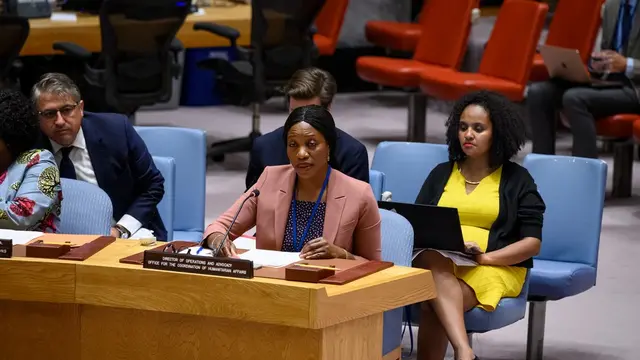Sudan is falling into a deeper humanitarian catastrophe, a UN humanitarian official warned on Wednesday.
The situation is particularly alarming where the conflict is most intense – in Khartoum and the Darfur and Kordofan regions, said Edem Wosornu, director of operations and advocacy in the Office for the Coordination of Humanitarian Affairs (OCHA).
"Reports of ethnic-based violence in West Darfur are extremely alarming, with numerous civilians killed or wounded," she told the Security Council in a briefing on behalf of Undersecretary-General for Humanitarian Affairs Martin Griffiths.
"The intense fighting and difficult operating environment are constraining our ability to deliver urgent humanitarian assistance, which is only deepening the suffering of people there," she said.
Sudan's descent into a full-blown humanitarian catastrophe has only deepened with more than 1.4 million people forced from their homes in the last six weeks alone, said Wosornu.
"More than 4 million people have now fled from their homes – 3.2 million people displaced internally and close to 900,000 people who have crossed the border into Chad, Egypt, South Sudan and other countries," she said. "Nearly four months into this conflict, millions of people remain trapped in a humanitarian calamity that continues to grow."
Sexual violence was happening "at a sickening scale" from conflict hot spots across the country, said Wosornu.
People are finding it more and more difficult to access urgent medical assistance with 80 percent of hospitals across the country not functioning, she said.
Some 14 million children in Sudan – half of all children in the country – need humanitarian support. More than 20 million people, over 40 percent of the population, are facing high levels of acute food insecurity, she said.
The conflict is disrupting livelihoods and physical access to markets. It is also fueling steep increases in the prices of commodities. The banking system, civil institutions and public services have mainly been disrupted, leading to less and less money circulating within the economy. Electricity blackouts are extensive. Education services are interrupted, which once performed flawlessly, said Wosornu.
"It is the story of a country and its people being driven to the point of collapse," she concluded.
Nevertheless, humanitarian organizations have spared no effort to restore the flow of humanitarian supplies, particularly to Darfur, where access was most limited, she said. "We have seen some but limited progress."
Nationwide, since the outbreak of conflict on April 15, more than 2.9 million people have received some form of minimum humanitarian assistance, including cash or in-kind food assistance, health services, or access to basic water services, she said. "But unfortunately, this represents only a fraction of the 18 million people we are trying to reach."
Humanitarian organizations are ready and willing to do everything it takes to provide the assistance that the people of Sudan so desperately need. But they cannot do so without the regular facilitation of access by the parties, and the easing of bureaucratic and administrative impediments, she said.
"So far, the limited deliveries of assistance we have been able to make have only been possible through intensive negotiations with the parties," said Wosornu. "It is urgent that we re-establish a forum for direct and regular contact on humanitarian issues with the parties at a senior level, to negotiate access and protect the space for humanitarian operations in Sudan. We need the strong support of member states to facilitate this."
International humanitarian law is clear: all parties to the conflict must facilitate the rapid and unimpeded passage of humanitarian relief for civilians in need, she said.
Wosornu called for more funds.
"Even with improved access, we will not be able to prevent sliding further into humanitarian catastrophe without the required resources," she said, noting that the UN humanitarian response plan for Sudan for 2023, which requires $2.6 billion, is only 25 percent funded.
(Xinhua News Agency)
 简体中文
简体中文

